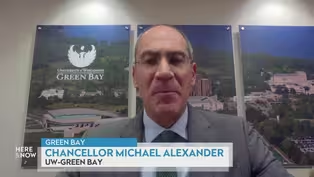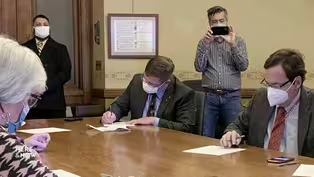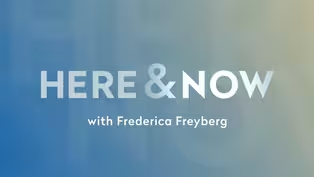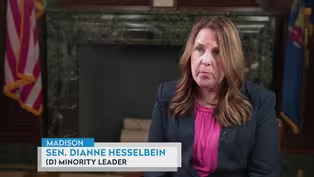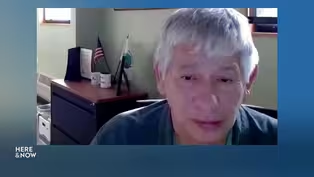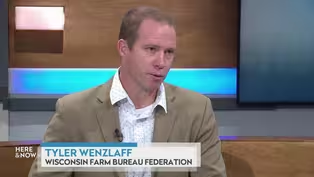Here and Now
Rep. Greta Neubauer on Wisconsin Politics Going Into 2025
Clip: Season 2300 Episode 2323 | 6m 8sVideo has Closed Captions
Greta Neubauer on impacts of redistricting, new Democratic lawmakers and the state budget.
Wisconsin Assembly Minority Leader Greta Neubauer, D-Racine, discusses the political impacts of redistricting, new Democratic lawmakers, a state budget surplus and the incoming Trump administration.
Problems playing video? | Closed Captioning Feedback
Problems playing video? | Closed Captioning Feedback
Here and Now is a local public television program presented by PBS Wisconsin
Here and Now
Rep. Greta Neubauer on Wisconsin Politics Going Into 2025
Clip: Season 2300 Episode 2323 | 6m 8sVideo has Closed Captions
Wisconsin Assembly Minority Leader Greta Neubauer, D-Racine, discusses the political impacts of redistricting, new Democratic lawmakers, a state budget surplus and the incoming Trump administration.
Problems playing video? | Closed Captioning Feedback
How to Watch Here and Now
Here and Now is available to stream on pbs.org and the free PBS App, available on iPhone, Apple TV, Android TV, Android smartphones, Amazon Fire TV, Amazon Fire Tablet, Roku, Samsung Smart TV, and Vizio.
Providing Support for PBS.org
Learn Moreabout PBS online sponsorship>> Coming off the election, state legislative leaders prepare to roll up their sleeves for the next session and a biennial budget.
Senior political reporter Zach Schultz sat down with Senate and Assembly leaders this week.
The Democrats, who won big in the redistricting fight and are now looking to use their newfound seats to leverage policy changes.
First up, Assembly Minority Leader Greta Neubauer, looking back at 2024.
>> What stands out at you as some of the more significant moments of the year?
>> So for over a decade, we have been working to get fair maps in Wisconsin, and that happened at the beginning of 2024.
We were really pleased to be able to run last cycle on competitive maps.
That had a whole lot of districts that were, of course, very close.
It's really good for our democracy and it's good for the voters to have more choice.
And we saw that those maps had a significant impact on the election cycle.
We were able to pick up ten seats as the Assembly Democrats and the Senate picked up several as well.
On the Democratic side.
So we're really pleased to see the numbers get a lot closer in both chambers.
We, of course, are always working towards the majority, but we got pretty far in one cycle and we are going to use that new power to have real wins for our constituents in the coming legislative cycle.
>> When speaking just for legislative Democrats.
Is it fair to say the redistricting was probably the most significant moment of the decade?
>> I think it's certainly up there.
>> Yeah, it can can it be overstated what this changes in the building?
>> No, I don't think it can.
I mean, in terms of the elections as as you and I'm sure many of your viewers know, it was near impossible for Democrats in the Assembly and Senate to get a majority under the old maps, despite often getting about 50% of the vote.
Right?
Sometimes over, sometimes a little under.
And so now when we get 50% of the vote, right, that should yield close to 50% of the seats.
And that's a very good thing.
We really did not have a functioning democracy here when it came to the state legislature.
And so now we've got a number of members who are going to be serving in this body in the upcoming year, who are on the red side and the blue side, who are in very close seats, and they're going to be looking over both shoulders, right.
And they're going to know that they've got an election in two years, and voters are going to expect them to deliver.
They're going to expect them to work hard on their behalf and not play partisan games.
Right.
Which often dominated in this building in the last decade.
And I think that's going to be a really good thing.
I'm hopeful that we're going to see a really productive bipartisan session.
>> How does how long does it take for that culture to shift?
Because in way back before the first set of gerrymandered maps in 2010, you know, the older members taught new members how to work in the Capitol.
But the most of the existing members have only lived under that strict, gerrymandered partizan divide.
So what will it take for new members to understand and work with new people about?
How does compromise legislation look like?
question.
I guess the first thing I'll say is we have 23 new Assembly Democrats this year.
That's actually a majority of our caucus.
That's going to be new legislators.
Many of them, of course, coming from local government or other backgrounds where they were interacting with the legislature.
So they know a little bit about it.
But I think it's a really good thing that we have so many new people coming in, because I think that is going to help with this culture shift in really a new era for the legislature.
We only have one member who served in the majority, and that's Chris Sinicki.
And so she, I'm sure is going to be helping our caucus understand what it was like to really be in a different position.
But I will say that last session, things already started to change, right?
With new maps coming in, we saw much more negotiation.
We saw bipartisan legislation on housing and the Brewers and shared revenue.
And I think we're going to see that only increase.
But we did get some practice last session in those negotiations, working with our colleagues and trying to get some big things done.
>> Once again, we're coming into a budget season with a large surplus in the state.
Republicans have already talked about there has to be a tax cut.
What kind of a tax cut could you expect Democrats to actually vote for?
Yeah.
session, we put forward alongside the governor.
Right.
A middle class working families tax cut.
We are very happy to have conversations about doing something like that.
Again, we do have a significant surplus.
And we also know that many people are struggling to make ends meet in Wisconsin due to recent inflation.
And so we're going to engage in those conversations in good faith.
I would say that the challenge is that Republicans keep coming forward with policy proposals on on tax cuts that are really about benefiting the richest people in Wisconsin.
And corporations.
And that's just not something that we're interested in doing.
We want a tax cut that is going to put money in the pockets of people who really need it.
And we are looking forward to those conversations.
a Biden administration that sent a lot of funds into the state of Wisconsin.
What are you expecting from a Trump administration, especially since they've talked about cutting federal agencies or some of the money that flows into the state?
>> Yeah, I think we need to be prepared to take care of ourselves in many ways.
I expect that some federal funds will have strings attached that we don't want, and we are going to need to do everything we can to support our local governments and our schools and our higher education institutions to continue to function and to provide great services to their students and the people who live in Wisconsin.
And that's going to be a big discussion in the state budget, right?
I think we're going to really need to think about how we're going to invest in our schools and how we're going to make sure that we are starting giving each kid in Wisconsin the opportunity to start life on a strong footing.
The legislature has not done its part in the past, and I don't think that our schools are going to get bailed out by the federal government.
So I'm hoping we can have a really robust conversation and see significantly increased coming budget.
coming budget.
Chancellor Michael Alexander on the Finances of UW-Green Bay
Video has Closed Captions
Clip: S2300 Ep2323 | 6m | Michael Alexander on growing enrollment and eliminating a budget deficit at UW-Green Bay. (6m)
Criminal Charges in 2020 False Electors Scheme Proceed
Video has Closed Captions
Clip: S2300 Ep2323 | 1m 28s | Charges in the 2020 false Trump electors case in Wisconsin are proceeding in court. (1m 28s)
Here & Now opening for December 13, 2024
Video has Closed Captions
Clip: S2300 Ep2323 | 55s | The introduction to the December 13, 2024 episode of Here & Now. (55s)
Sen. Dianne Hesselbein on Wisconsin Politics Going Into 2025
Video has Closed Captions
Clip: S2300 Ep2323 | 4m 42s | Dianne Hesselbein on the Democratic caucus, election results and state budget process. (4m 42s)
Tribe and Environmental Groups Offer New Line 5 Challenges
Video has Closed Captions
Clip: S2300 Ep2323 | 55s | The Bad River Tribe and environmental groups challenge the Enbridge oil pipeline reroute. (55s)
Tyler Wenzlaff on the Politics of Extending the Farm Bill
Video has Closed Captions
Clip: S2300 Ep2323 | 6m 2s | Tyler Wenzlaff on an extension to the 2018 Farm Bill and impacts on farmers and families. (6m 2s)
Providing Support for PBS.org
Learn Moreabout PBS online sponsorship
- News and Public Affairs

Top journalists deliver compelling original analysis of the hour's headlines.

- News and Public Affairs

FRONTLINE is investigative journalism that questions, explains and changes our world.












Support for PBS provided by:
Here and Now is a local public television program presented by PBS Wisconsin
